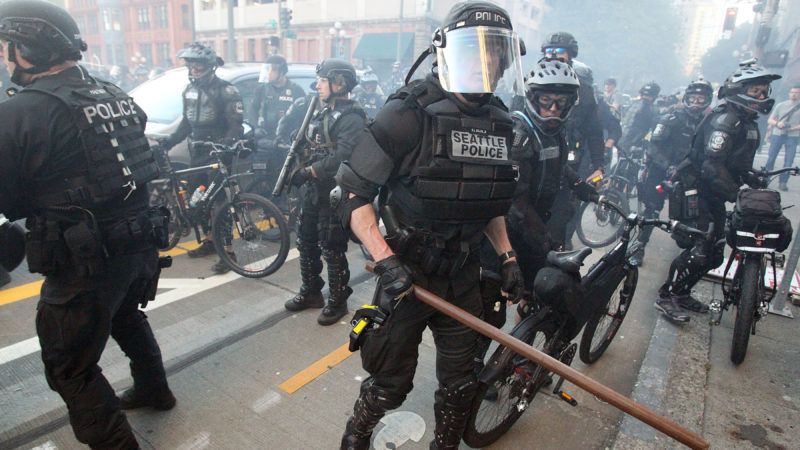A Labor Council Has Expelled Seattle's Police Union. Good.
Police unions exist to protect cops at the expense of the public.

A labor coalition in Seattle, Washington, has voted to expel the city's police union.
The King County Labor Council, an affiliate of the AFL-CIO, confirmed Wednesday that the Seattle Police Officers Guild (SPOG) would be removed from its ranks, ousting the association that bargains on behalf of 1,300 Seattle cops.
Good. Police unions exist to protect officers at all costs, often to the detriment of the public that they've sworn to protect.
The council, which represents 150 unions and more than 100,000 workers, has enthusiastically advocated for SPOG in the past. The group was partially responsible for having the police union's contract with the Seattle City Council renewed two years ago.
But the momentum around that cause has changed—and for good reason. The killing of George Floyd, the unarmed man who died after a Minneapolis police officer dug a knee into Floyd's neck for over 8 minutes, has reinvigorated the conversation around what reforms are necessary to rein in police abuse.
Unions are an easy target. In many places they have near-monopolistic control over police accountability, working to shield them from complaints of malpractice.
One need not look far for a recent example. The death of Breonna Taylor prompted widespread outrage—the 26-year-old Louisville woman was shot 8 times in her home during a no-knock drug raid, all because police suspected a former boyfriend may have used her address to receive packages. Her then-boyfriend, Kenneth Walker, armed himself as cops barged into Taylor's home in the middle of the night, shooting an officer who he believed to be an intruder.
But the local police union didn't see the incident as a tragic drug raid gone wrong. It chose to focus its ire on a city council member who said Walker was within his rights to try to protect Taylor.
"This is the union's focus: not demanding justice for a woman killed by police in her home but demanding an apology from a local politician who had the temerity to praise a citizen for defending himself and his girlfriend during a botched police maneuver," Reason's Peter Suderman writes. "The union's goal, it seems, is to protect the police from public criticism, not to protect the public from bad policing. That's what police unions do."
The politics around police unions can be strange. Conservatives often decry public-sector unions as bulwarks protecting government employees from a barrage of necessary criticism and reforms. Yet Republicans seem to have an affinity for police unions, notwithstanding the fact that those groups are exactly what the party says it opposes: bulwarks protecting government employees from a barrage of necessary criticism and reforms.
Liberals, meanwhile, usually align themselves with such collective-bargaining groups. That's especially true when it comes to teachers unions, which often prioritize teachers over the students they serve. Yet in this cultural moment, Democrats been quicker to acquiesce to the idea that police unions need to go.
"Police unions are very different. They're very conservative, a lot of them are even Republican," a House Democratic leadership aide recently told Axios. "They don't have the same progressive beliefs."
But such decisions need not and should not turn on which unions have the "right" beliefs. It should turn on the moral quandary of monopoly institutions shielding government agents from accountability. That's a principle that Democrats and Republicans both like to invoke—just not, unfortunately, in the same contexts.


Show Comments (32)